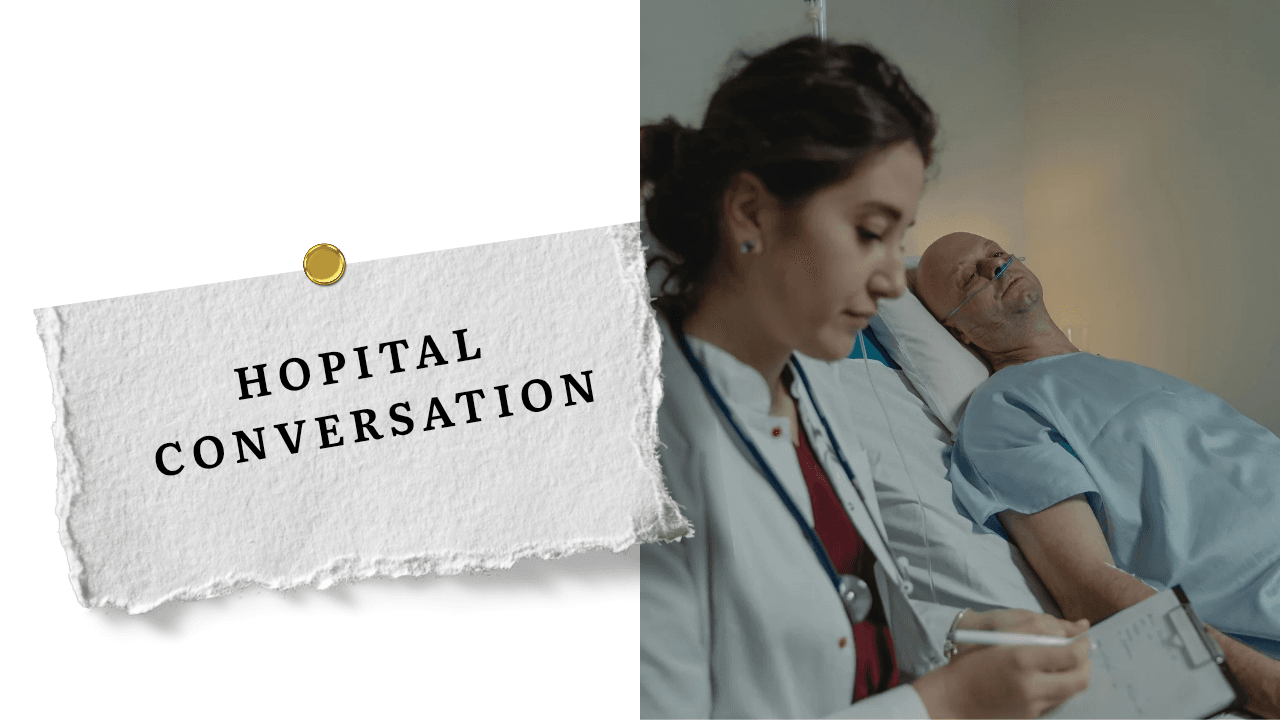Practicing spoken English for hospital conversations can be incredibly useful, whether you’re a patient, a visitor, or a healthcare professional. Below, I’ll provide a series of dialogues and phrases based on the hospital setting, focusing on natural, conversational English. These will cover various scenarios, such as talking to a patient, speaking with a nurse or doctor, and discussing feelings or needs. I’ll also include some pronunciation tips and common expressions to help you sound more fluent.
1. Greeting and Checking In on a Patient
Scenario: You’re visiting a friend or family member in the hospital and want to check how they’re doing.
Dialogue:
- You: Hey, how are you feeling today?
(Pronunciation tip: “Feeling” sounds like “FEE-ling,” with the stress on the first syllable.) - Patient: Hi! I’m doing a bit better, thanks for asking. How about you?
(Common phrase: “A bit better” – means slightly improved, often used to describe health.) - You: I’m good, thanks. I brought you some flowers to brighten up your room!
(Tip: “Brighten up” is a phrasal verb meaning to make something more cheerful.) - Patient: Oh, that’s so sweet of you! They look lovely.
(Pronunciation tip: “Lovely” sounds like “LUHV-lee,” with a soft “v” sound.)
Practice Phrases:
- “I hope you’re feeling better soon!”
- “How’s your day going so far?”
- “I brought you something to cheer you up.”
- “Do you need anything, like a glass of water?”
2. Talking to a Nurse About a Patient’s Needs
Scenario: You’re a family member asking a nurse about the patient’s condition or needs.
Dialogue:
- You: Excuse me, nurse, can I ask how my brother is doing today?
(Tip: “Excuse me” is a polite way to get someone’s attention.) - Nurse: Of course! He’s been resting well, and his fever has gone down a little.
(Common phrase: “Gone down” – means decreased, often used for symptoms like fever.) - You: That’s good to hear. Does he need anything, like more blankets or water?
(Pronunciation tip: “Hear” sounds like “HEER,” with a long “ee” sound.) - Nurse: He’s okay for now, but I’ll check on him again soon. Thanks for asking!
(Tip: “Check on” means to look in on someone to see how they’re doing.)
Practice Phrases:
- “Can you tell me how he/she is doing?”
- “Does he/she need anything right now?”
- “Thank you for taking care of him/her.”
- “Can I get him/her some more pillows?”
3. A Patient Speaking to a Doctor
Scenario: You’re a patient describing your symptoms or asking questions about your treatment.
Dialogue:
- Patient: Doctor, I’ve been feeling really tired lately. Is that normal?
(Pronunciation tip: “Lately” sounds like “LAYT-lee,” with the stress on the first syllable.) - Doctor: Let’s take a look. Have you been sleeping well, or has anything else been bothering you?
(Common phrase: “Take a look” – means to examine or check something.) - Patient: Not really. I also feel a bit dizzy sometimes.
(Tip: “A bit dizzy” – means slightly unsteady or lightheaded, a common way to describe symptoms.) - Doctor: Okay, we’ll run a few tests to figure out what’s going on. Don’t worry, we’ll take care of you.
(Pronunciation tip: “Figure out” sounds like “FIG-yer OUT,” with stress on both words.)
Practice Phrases:
- “I’ve been feeling [symptom] for a few days.”
- “Is this normal, or should I be worried?”
- “Can you explain what this medicine does?”
- “I’m feeling a little better, but still not great.”
4. Lighthearted Conversation to Cheer Up a Patient
Scenario: You’re trying to lift the patient’s spirits with a fun, light topic.
Dialogue:
- You: Hey, I was thinking—what’s the first thing you want to do when you’re out of here?
(Tip: “Out of here” is a casual way to say “discharged from the hospital.”) - Patient: Hmm, I’d love to go to the beach and just relax.
(Pronunciation tip: “Beach” sounds like “BEECH,” with a long “ee” sound.) - You: That sounds amazing! I can already picture you soaking up the sun.
(Common phrase: “Soaking up the sun” – means enjoying the sunshine.) - Patient: Yeah, that’d be perfect. What about you—where would you go?
(Tip: “What about you?” is a great way to keep the conversation going.)
Practice Phrases:
- “What’s your favorite place to go on vacation?”
- “Do you have any fun plans for when you’re feeling better?”
- “What’s a movie that always makes you laugh?”
- “If you could eat anything right now, what would it be?”
5. A Nurse Encouraging a Patient
Scenario: A nurse is speaking to a patient to motivate them during recovery.
Dialogue:
- Nurse: Good morning! How about we try walking a few steps today?
(Pronunciation tip: “Morning” sounds like “MOR-ning,” with the stress on the first syllable.) - Patient: I don’t know… I’m still feeling pretty weak.
(Common phrase: “Pretty weak” – means quite tired or lacking strength.) - Nurse: That’s okay, we’ll take it slow. You’re doing great, and every step helps you get stronger.
(Tip: “Take it slow” means to go at a comfortable pace, often used to reassure.) - Patient: Alright, I’ll give it a try. Thanks for the encouragement!
(Pronunciation tip: “Encouragement” sounds like “en-KUR-ij-ment,” with stress on the second syllable.)
Practice Phrases:
- “You’re making great progress!”
- “Let’s take it one step at a time.”
- “I’m here to help you, don’t worry.”
- “You’ve got this—let’s do it together.”
6. Talking About Hospital Life
Scenario: Two patients or a patient and visitor are chatting about their hospital experience.
Dialogue:
- Patient 1: So, how do you like the hospital food here?
(Pronunciation tip: “Food” sounds like “FOOD,” with a long “oo” sound.) - Patient 2: It’s not too bad, but I miss home-cooked meals. What about you?
(Common phrase: “Not too bad” – means it’s okay, a neutral response.) - Patient 1: Same! I can’t wait to have some of my mom’s cooking.
(Tip: “Can’t wait” is a common way to express excitement or eagerness.) - Patient 2: Oh, that sounds so good. What’s your favorite dish?
(Pronunciation tip: “Favorite” sounds like “FAY-vrit,” with the stress on the first syllable.)
Practice Phrases:
- “What do you think of the hospital staff?”
- “Do you find it hard to sleep here?”
- “What’s been the toughest part of being here?”
- “I can’t wait to get back to my own bed!”
Tips for Spoken English in a Hospital Setting
- Use Simple, Clear Language: Hospital settings can be stressful, so keep your sentences short and easy to understand. For example, instead of saying, “I was wondering if you might require any additional assistance,” say, “Do you need any help?”
- Practice Polite Expressions: Politeness is key in a hospital. Use phrases like:
- “Could you please…?”
- “Thank you so much.”
- “I really appreciate your help.”
- Show Empathy: Use phrases that show you care, such as:
- “I’m sorry you’re going through this.”
- “That sounds really tough.”
- “I hope you feel better soon.”
- Work on Intonation: English speakers often use a rising tone to show concern or ask questions (e.g., “How are you feeling? ↗”) and a falling tone to reassure (e.g., “You’ll be okay. ↘”).
- Learn Common Phrasal Verbs: These are often used in conversational English. Examples:
- “Cheer up” (make someone happier)
- “Look after” (take care of)
- “Get better” (recover)
Practice Activity
Role-Play Exercise: Pair up with a friend or practice alone by taking on both roles. Choose one of the scenarios above and act out the conversation. Then, switch roles. Try to use at least three new phrases from the “Practice Phrases” section each time.
Example:
- Person A (Visitor): “Hey, how are you feeling today?”
- Person B (Patient): “I’m doing a bit better, thanks for asking. I’ve been feeling a little dizzy, though.”
- Person A: “I’m sorry to hear that. Do you need anything, like a glass of water?”
- Person B: “That’d be great, thanks!”
Let me know if you’d like more dialogues, specific scenarios, or help with pronunciation for any of these phrases!



